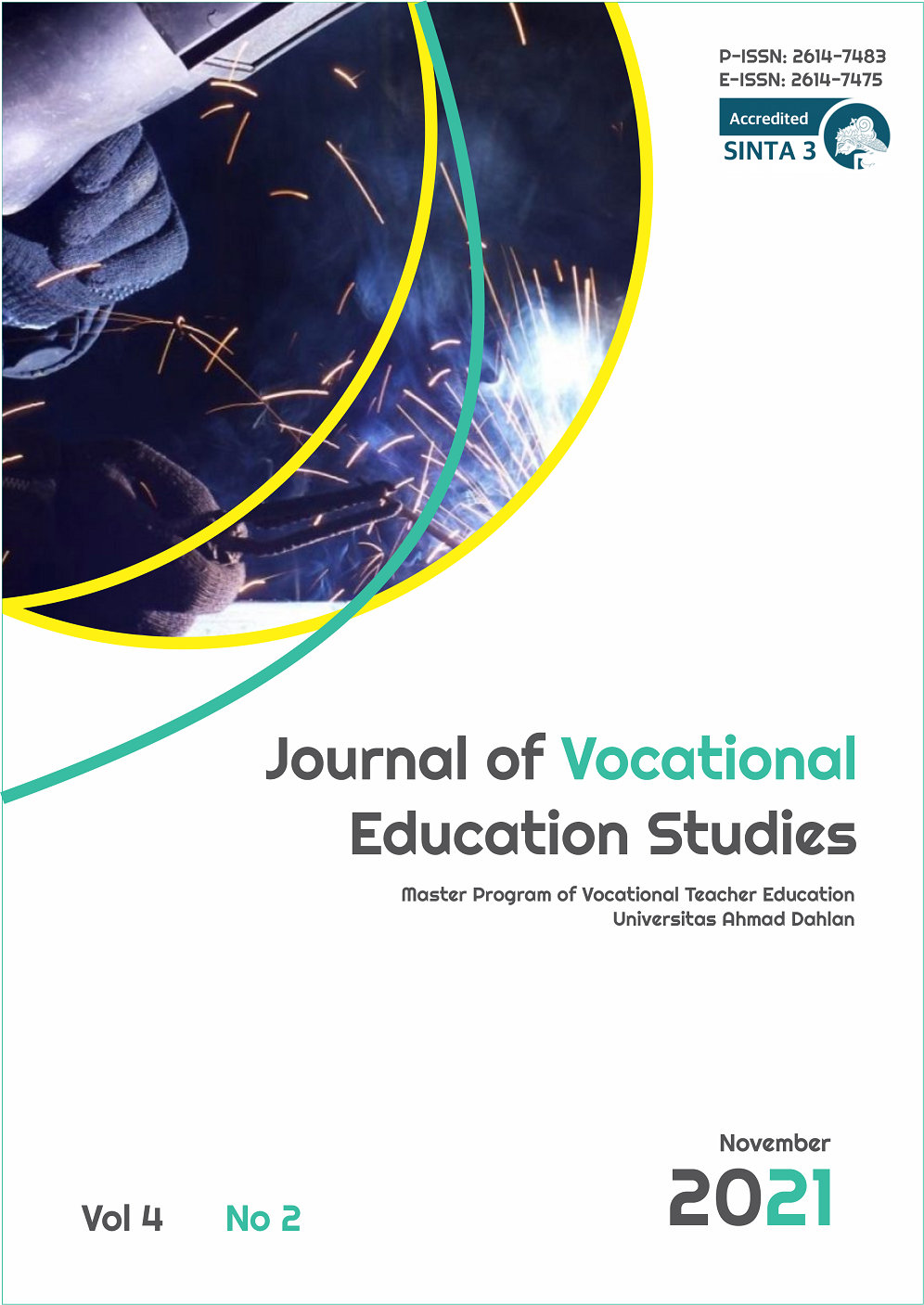Development of Educational Game Media Based on Android for Supporting Blended Learning in Basic Electronics Lessons
DOI:
https://doi.org/10.12928/joves.v4i2.4645Keywords:
Blended Learning, Android Education Media, Basic ElectronicsAbstract
The objectives of this study were to: (1) develop Android-based learning media for supporting blended learning in introductory electronics lessons and (2) determine the effectiveness and the student satisfaction level of the developed product.
This study used the Research and Development method with the ADDIE development model, which consisted of defining, designing, developing, implementing, and evaluating stages. The research subjects consisted of two media expert validators, two material expert validators, and 31 product trial students. The research instrument used a questionnaire for media and material experts, also tests and questionnaires for students. This study uses the percentage technique to determine the student satisfaction level of the developed product. At the same time, the product testing carries out with an experimental design (before-after) and a one-group pretest-posttest pattern.
This study has produced an educational game media based on Android to support blended learning in introductory electronics lessons. The results showed that the product developed obtained a validity score of 82.5% from media experts, which was on valid criteria. A score of 93.7% from material experts was in very valid criterion. The post-test average score of 80.97 is higher than the average pre-test score of 64.09. The level of student satisfaction with the product developed was excellent, with an average score of 85.8 on a scale of 100. The developed product can effectively support blended learning in introductory electronics lessons at vocational schools.
References
Bulut, D., Samur, Y., & Cömert, Z. (2022). The effect of educational game design process on students’ creativity. Smart Learning Environments, 9(1). https://doi.org/10.1186/s40561-022-00188-9
Cheung, S. Y., & Ng, K. Y. (2021). Application of the educational game to enhance student learning. Frontiers in Education, 6(March), 1–10. https://doi.org/10.3389/feduc.2021.623793
Dewantara, D., Misbah, M., & Wati, M. (2020). The implementation of blended learning in analog electronic learning. Journal of Physics: Conference Series, 1422(1). https://doi.org/10.1088/1742-6596/1422/1/012002
Dziuban, C., Graham, C. R., Moskal, P. D., Norberg, A., & Sicilia, N. (2018). Blended learning: the new normal and emerging technologies. International Journal of Educational Technology in Higher Education, 15(3), 1–16.
Graham, C. R. (2006). The handbook of blended learning: Global perpectives, local designs. San Francisco: John Wiley & Sons, Inc.
Jusuf, H. (2016). Pengembangan blended learning untuk memotivasi peserta didik dalam memahami materi ajar. Jurnal Ilmiah Teknologi Infomasi Terapan, 3(1), 28–3.
Kotsifakos, D., Petrakis, G., Stavrou, M., & Douligeris, C. (2020). An online game for the digital electronics course for vocational education and training (vet) students. In M. Auer & T. Tsiatsos (Eds.), The Challenges of the Digital Transformation in Education. ICL 2018. Advances in Intelligent Systems and Computing, vol 916. Springer, Cham.
Liu, Z. Y., Shaikh, Z. A., & Gazizova, F. (2020). Using the concept of game-based learning in education. International Journal of Emerging Technologies in Learning, 15(14), 53–64. https://doi.org/10.3991/ijet.v15i14.14675
North, B., Diab, M., Lameras, P., Zaraik, J., Philippe, S., Muller, J., & Fischer, H. (2021). Developing a platform for using game-based learning in vocational education and training. IEEE Global Engineering Education Conference, EDUCON, 2021-April(April), 1345–1352. https://doi.org/10.1109/EDUCON46332.2021.9454124
Satrio, Y. D., Wardoyo, C., Sahid, S., Fauzan, S., & Ma’ruf, D. (2021). The effectiveness of educational games on post-pandemic learning. KnE Social Sciences, 5(8), 366–373. https://doi.org/10.18502/kss.v5i8.9388
Shinta, I. R., & Candra, O. (2021). The effect of blend-Learning on basic electrical and electronics subject in new normal period. JTEV (Jurnal Teknik Elektro dan Vokasional), 7(2), 291–296. https://doi.org/10.24036/jtev.v7i2.113263
Sugiyono, P. (2015). Metode penelitian kombinasi (mixed methods). Alfabeta.
Velaora, C., Dimos, I., Tsagiopoulou, S., & Kakarountas, A. (2022). A game-based learning approach in digital design course to enhance students’ competency. Information (Switzerland), 13(4), 1–25. https://doi.org/10.3390/info13040177
Yulianti, A., & Ekohariadi, E. (2020). Pemanfaatan media pembelajaran berbasis game edukasi menggunakan aplikasi construct 2 pada mata pelajaran komputer dan jaringan dasar. Jurnal IT-EDU, 5(1), 527–533. https://ejournal.unesa.ac.id/index.php/it-edu/article/view/38272
Downloads
Published
Issue
Section
License
Copyright (c) 2021 Universitas Ahmad Dahlan

This work is licensed under a Creative Commons Attribution-ShareAlike 4.0 International License.
Authors who publish with Journal of Vocational Education Studies (JOVES) agree to the following terms: Authors retain the copyright and grant the Universitas Ahmad Dahlan right of first publication with the work simultaneously licensed under a Creative Commons Attribution License (CC BY-SA 4.0) that allows others to share (copy and redistribute the material in any medium or format) and adapt (remix, transform, and build upon the material) the work for any purpose, even commercially with an acknowledgement of the work's authorship and initial publication in Universitas Ahmad Dahlan. Authors are able to enter into separate, additional contractual arrangements for the non-exclusive distribution of the journal's published version of the work (e.g., post it to an institutional repository or publish it in a book), with an acknowledgement of its initial publication in Universitas Ahmad Dahlan. Authors are permitted and encouraged to post their work online (e.g., in institutional repositories or on their website) prior to and during the submission process, as it can lead to productive exchanges, as well as earlier and greater citation of published work (See The Effect of Open Access).










.png)



